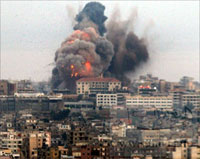Large explosion in Beirut suburb kills four people
A large explosion in Christian suburb east of Beirut killed four people and injured dozens.

The agency said Brig. Gen. Francois Hajj, head of military operations in the army command, was killed in the explosion along with his bodyguard. His name had been mentioned among others as a possible successor to army commander Michel Suleiman, if he is elected president.
The army had no immediate comment.
The explosion came as Lebanon is embroiled in its worst political crisis since the end of the 1975-90 civil war and amid heightened tensions between pro-government and opposition groups. The country has been without a president since Nov. 23 when Emile Lahoud left office and a deadlocked parliament failed to elect a successor.
This the first time the military has been targeted in a bombing in recent months. The military has managed to keep the peace amid the serious political crisis in recent months.
The army also crushed Islamic militants in summer fighting in a northern Lebanon Palestinian refugee camp that left hundreds dead. The bombing came as pro- and anti-government groups were locked in dispute over how to elect the army commander, Gen. Michel Suleiman, as compromise candidate to fill the vacant president's post.
Red Cross rescuers reported two dead and seven wounded who were taken to area hospitals. Others were being treated on the spot and rescuers were searching in wrecked vehicles for more casualties, said George Kettaneh, of the rescue service at the Lebanese Red Cross.
He spoke on Lebanese Broadcasting Corp. TV, which earlier reported that four dead and dozens were wounded in the explosion.
Two bodies were thrown about 15 meters (yards) by the force of the explosion. Troops sealed off the area as firefighters tried to put out the flames in at least two cars. The road was blacked with the soot as black smoke covered the area.
A small stun grenade exploded on the edge of the Lebanese capital late at Tuesday, causing no casualties or damage.
Lebanese security officials, speaking on customary condition of anonymity in line with standing government regulations, said at least two cars were set afire and several others were damaged in the bombing outside the municipality building in the town of Baabda .
The wooded, hilly Baabda is the historic capital of Mount Lebanon province, and seat of the presidential palace, which is on a nearby hill. The Defense Ministry and the army command are located in the adjacent town of Yarze .
The explosion, which occurred before 7 a.m. (0500GMT) was heard by residents on the edge of the Lebanese capital. The area nearby is usually packed later in the morning with civil servants going to work at the provincial government house.
Security officials could not tell whether the bomb was packed in a car or placed on the side of the road.
The last major explosion on Sept. 19 killed anti-Syrian lawmaker Antoine Ghanem on a Beirut street, an attack blamed by his supporters in the government coalition on Syria. Syria denied involvement.
The explosion occurred two years to the day to a bombing that killed prominent journalist Gebran Tueni in a car bombing his supporters had blamed on Syria . Lebanon has been rocked by a series of explosion since a massive truck bombing killed former Premier Rafik Hariri in 2005 in central Beirut.
Subscribe to Pravda.Ru Telegram channel, Facebook, RSS!





